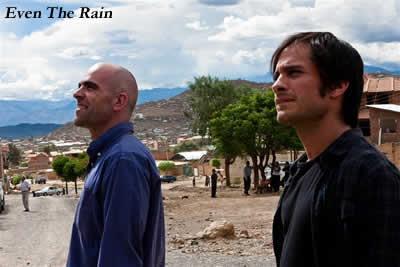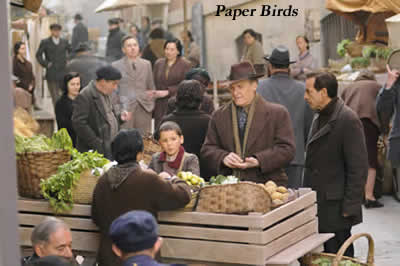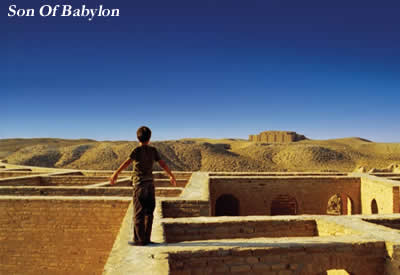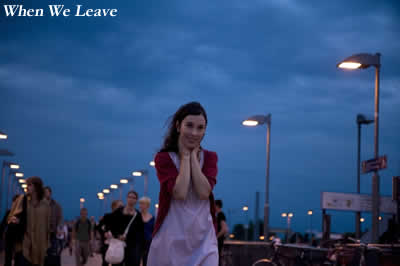Palm Springs – January 9, 2011: Today, Cinema Without Borders has announced the five nominees for its Bridging The Borders Award. The Bridging The Borders Award at the 2011 Palm Springs International Film Festival will be given to the most successful film in bringing the people of our world closer together.
The five nominees for the Cinema Without Borders Bridging The Borders Award are, Eastern Plays (Bulgaria), Even The Rain (Spain), Paper Birds (Spain), Son Of Babylon (Iraq), and When We Leave (Germany).
The Bridging The Borders Award winning film will be announced on Sunday, January 16th, at the Palm Springs International Film Festival award ceremony.
 Eastern Plays, Bulgaria, directed by Kamen Kalev. The attempt to find a meaningful place in the world undertaken by many members of former Eastern European nations struggling in the post-communist wake serves as the background for Kamen Kalev’s sharp, honest, and very timely drama about two young brothers in Sofia. It so, a former drug addict and artist now taking a methadone treatment, makes ends meet (barely) by working as a carpenter. His younger brother Georgi, still living at home, finds a way of alleviating his sense of disaffected displacement by joining a neo-Nazi group with shady connections to nationalist politicians. When It so intervenes to help a Turkish family escape a gang of skinheads—Georgi is one of them—he strikes up a friendship with the attractive daughter Isil But are their worlds too far apart to form any real connection? By grounding his exploration of what it is to be young in Bulgaria today—the unemployment, the directionless searching, the insidious rise of nationalism—in Itso’s all-too-human story, Kalev crafts a powerful and deeply felt work that, despite everything, sees hope for the future.
Eastern Plays, Bulgaria, directed by Kamen Kalev. The attempt to find a meaningful place in the world undertaken by many members of former Eastern European nations struggling in the post-communist wake serves as the background for Kamen Kalev’s sharp, honest, and very timely drama about two young brothers in Sofia. It so, a former drug addict and artist now taking a methadone treatment, makes ends meet (barely) by working as a carpenter. His younger brother Georgi, still living at home, finds a way of alleviating his sense of disaffected displacement by joining a neo-Nazi group with shady connections to nationalist politicians. When It so intervenes to help a Turkish family escape a gang of skinheads—Georgi is one of them—he strikes up a friendship with the attractive daughter Isil But are their worlds too far apart to form any real connection? By grounding his exploration of what it is to be young in Bulgaria today—the unemployment, the directionless searching, the insidious rise of nationalism—in Itso’s all-too-human story, Kalev crafts a powerful and deeply felt work that, despite everything, sees hope for the future.
Even The Rain, Spain, directed by: Iciar Bollain . An idealistic young director (Gael Garcia Bernal) sets out to expose Christopher Columbus as a conquering imperialist, only after gold, who exploited and destroyed indigenous cultures as he pursued his fortune. His producer (Luis Tosar), seemingly oblivious to the irony, moves production of the period piece to Bolivia so as to take advantage of the lower cost of labor there. When they arrive, they encounter a population caught up in the throes of civic upheaval as the government tries to privatize the water supply. As the crisis around them increasingly encroaches upon the production, the film focuses in on the director and producer, their personal evolution and unexpected reactions to the plight of those around them. Based on the Cochabamba Water Crisis of 2000, veteran director Iciar Bollain’s powerful and layered film set against historic and current events, lays bare the hypocrisies of a post-colonial world where injustices to the dispossessed continue unchecked. Beautifully executed period details contrasted with the raw energy of the current crisis blur the lines between fiction, reality, past and present.
and destroyed indigenous cultures as he pursued his fortune. His producer (Luis Tosar), seemingly oblivious to the irony, moves production of the period piece to Bolivia so as to take advantage of the lower cost of labor there. When they arrive, they encounter a population caught up in the throes of civic upheaval as the government tries to privatize the water supply. As the crisis around them increasingly encroaches upon the production, the film focuses in on the director and producer, their personal evolution and unexpected reactions to the plight of those around them. Based on the Cochabamba Water Crisis of 2000, veteran director Iciar Bollain’s powerful and layered film set against historic and current events, lays bare the hypocrisies of a post-colonial world where injustices to the dispossessed continue unchecked. Beautifully executed period details contrasted with the raw energy of the current crisis blur the lines between fiction, reality, past and present.
 Paper Birds, Spain, directed by: Emilio Aragón. After the civil war has destroyed their lives, an odd assortment of vaudeville artists bands together to perform in a traveling troupe. Scenes of rehearsal and joyous performance are contrasted with the oppressive watchfulness of Francoist agents, as the troupe struggles for subsistence on days when applause must suffice to sate the hunger pangs. Part celebration of this lost art, and part a touching tale of the bonds of friendship that develop between the artists, the film retains a sincere tone without lapsing into melodrama.
Paper Birds, Spain, directed by: Emilio Aragón. After the civil war has destroyed their lives, an odd assortment of vaudeville artists bands together to perform in a traveling troupe. Scenes of rehearsal and joyous performance are contrasted with the oppressive watchfulness of Francoist agents, as the troupe struggles for subsistence on days when applause must suffice to sate the hunger pangs. Part celebration of this lost art, and part a touching tale of the bonds of friendship that develop between the artists, the film retains a sincere tone without lapsing into melodrama.
This loyal and accurate portrayal of vaudevillians comes from first time director Emilio Aragon, once a clown himself (performing as the famed Milikito) and features superb performances from Imanol Arias, Lluis Homar and Carmen Machi. Set in the dark days of the Franco dictatorship with the shadow of Nazism looming, this story shows us how the pursuit of excellence one’s craft, no matter how humble, can elevate us out of the daily drudgery of survival, even if fleetingly so
Son of Babylon, Iraq, directed by Mohamed Al-Daradji . In the chaotic aftermath of the fall of Saddam Hussein, Ahmed, a  young Kurdish boy, and his grandmother set out in search of his father (her son), arrested and missing since the Gulf War. Against the backdrop of the U.S. occupation, they make their way through a country in ruins, from prison to mosque to mass grave.
young Kurdish boy, and his grandmother set out in search of his father (her son), arrested and missing since the Gulf War. Against the backdrop of the U.S. occupation, they make their way through a country in ruins, from prison to mosque to mass grave.
Despite daunting obstacles—Ahmed is responsible for all communication as his grandmother speaks no Arabic—they persevere, and along the way they meet many others on similar journeys. One such acquaintance is Musa, a former member of Saddam’s Republican Guard, trying to come to terms with his participation in the brutal regime. In Son of Babylon, Mohamed Al-Daradji has crafted a beautiful and melancholy testament to the suffering of millions, as well as a deeply humane vision of a people in search of the way forward.
 When We Leave, Germany, directed by Feo Aladag. What would you sacrifice to maintain your dignity? Trapped in an unhappy marriage in Istanbul, Umay flees back to her family in Berlin with her five-year-old son, Cem. Although she explains the horrors of her marriage to her family, they insist that she return to her husband. While she and her family are German citizens, they are also of Turkish descent, and her return pits them against the traditions of the Turkish immigrant community.
When We Leave, Germany, directed by Feo Aladag. What would you sacrifice to maintain your dignity? Trapped in an unhappy marriage in Istanbul, Umay flees back to her family in Berlin with her five-year-old son, Cem. Although she explains the horrors of her marriage to her family, they insist that she return to her husband. While she and her family are German citizens, they are also of Turkish descent, and her return pits them against the traditions of the Turkish immigrant community.
When her family decides to restore their reputation by returning Cem to his father, Umay escapes from under their roof to establish a new life for herself. But her desire for her family’s approval, and their desire for traditional acceptability, places them in unavoidable conflict. Directed with both a cool eye and an escalating sense of dread, debuting director Feo Aladag skillfully explores the identity conflicts of many second-generation immigrants and their dual obligations. And her stellar cast, led by a virtuoso performance from Sibel Kekilli, brilliantly portrays a family whose love for each other places them at odds with their dreams.

